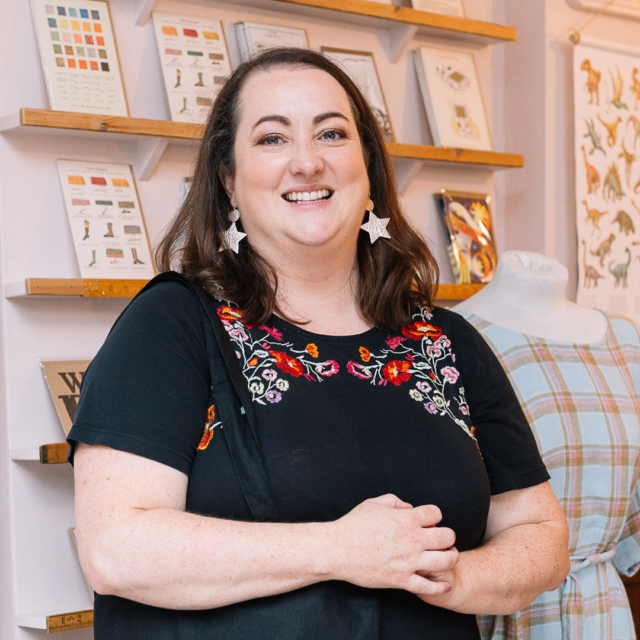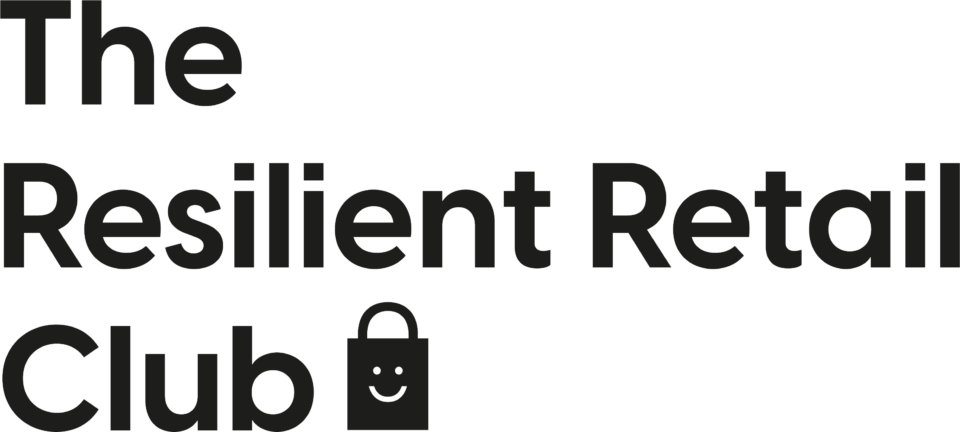5 Truths About Cash Flow in Retail
Catherine Erdly: How do you find managing the cashflow in your business? If it is something that comes to you easily, it doesn’t bother you at all. You feel like you’ve got it completely handled and you’re completely under control, then you may be surprised to hear that you are definitely in a minority.
Hi, my name’s Catherine Erdly. I’m your host today of the Resilient Retail Game Plan, episode number 198. And I’m also the founder of the Resilient Retail Club, which is my membership group and mastermind for product businesses. You can find out more at resilientretailclub. com. And today I’m going to be sharing with you what I learned by talking to a large number of small business owners about managing their cash flow.
Over the last few weeks, I’ve been doing some in depth customer research, been talking to people one on one all about how they manage their cash flow in their business. And it has been absolutely fascinating.
in an earlier episode of this podcast, Episode number 189. I spoke to Katie Tucker, who is the author of a book called Do Penguins Eat Peaches? And it’s all about talking to your customer. And I was so inspired by our chat. I felt like it was time that I had some long overdue conversations of my own with independent retailers, e commerce brands, and makers, designers, small business owners of product businesses.
And I highly recommend it. I found it absolutely fascinating. I’ve done this sort of research in the past, but it’s been a little while. So if you haven’t spoken to your customers recently, I definitely recommend you go listen to episode number 189, get some ideas about how you can talk to your customers and go have a chat with them because I learned a huge amount.
And that’s what I want to share with you in today’s episode. What I learned about cashflow management from talking to product business owners.
Welcome to the Resilient Retail Game Plan, a podcast for anyone wanting to start, grow or scale a profitable creative product business with me, Catherine Erdely.
The Resilient Retail Game Plan is a podcast dedicated to one thing, breaking down the concepts and tools that I’ve gathered from 20 years in the retail industry and showing you how you can use them in your business.
This is the real nuts and bolts of running a successful product business, broken down in an easy, accessible way.
This is not a podcast about learning how to make your business look good. It’s the tools and techniques that will make you and your business feel good.
Confidently plan, launch and manage your products and feel in control of your sales numbers and cashflow to help you build a resilient retail business.
So the first thing I want to say is that actually one thing that came out of these conversations was that people were sometimes a little reluctant to admit this to begin with.
What is cash flow exactly?
Catherine Erdly: But several people said this to me that when they hear the term cashflow and cashflow management, they’re like, I don’t even always necessarily know what that means. So let’s start with a definition.
Well, cashflow is really, it’s the lifeblood of your business and it is related to your profit, but not in, not the same thing.
And it’s really, Much more closely linked to timing. So it’s understanding when money is coming into your business in form of sales, revenue. And when that money is going to be going out of your business in bills, whether that’s regular repeat bills or whether it’s irregular bills, such as purchasing your stock, things like that.
And basically everything in the business hinges on your ability to have this cash flow under control. In other words, to not wake up one day and realize that you’ve got a bill that has attempted to come out of the account and couldn’t, it failed. Or perhaps suddenly realize, Oh, actually I thought I had lots of money in the bank, but then the next week it all just vanishes.
And what I wanted to get to the bottom of with this research was finding out how people go about managing this in their business. What some of their struggles were and what some of the common themes were that came out of it. Full disclosure, I’m doing this because I am developing a service to help you with cashflow management, which I will be revealing and launching later this year.
I’m putting the tweaks, the final finishing touches to it and talking to people really, really helped me understand what they needed support with and definitely gave me lots of ideas.
So again, if you’re looking for new product ideas, I do highly recommend doing these in depth one on one customer research interviews because it’s hugely useful and important.
What does good cash flow management look like?
Catherine Erdly: What does it look like when it’s working well? Well, good cashflow management, in my opinion, is that you always know, in advance, what your bank balance is going to be, and you are able to understand within a margin of error, obviously what your, whether or not you’re going to be in a positive cashflow situation, so have enough money or whether or not you’re going to have an issue.
Even if your sales forecasts are not quite correct, maybe you perform under your sales forecast, then if you’ve got it all mapped out, then you can anticipate a problem even two, three months in advance, and maybe even take some action in the meantime to do things like pull back on your stock purchasing to avoid creating a bigger issue.
Good cash flow management looks like having visibility of what’s going to be coming in and going out, or at least an estimate, being able to update it regularly to take into account what’s actually happening, being able to predict problems before they occur and to take action to avoid them.
And it also allows you to, map out decisions before you make them. So for example, if you decide you want to increase how much you pay yourself or how much you pay your team members, if you’ve got this control, if you’ve got this visibility with your cash flow management, you’re able to make those decisions.
And of course. In an ideal world, cashflow management means that you’ve always got the money you want in your business to do the things that you want to do, to do some of the things that you want or need to do in order to move your business forward. It means not running out of cash when it comes to purchasing stock, being able to place orders, being able to pay for marketing activities that you might want to, and just generally having a sense in your business of there being enough money in there for the business activities, but also for yourself.
And I think there’s a big correlation as well between your ability to pay yourself and having a handle on your cashflow management as well. When it’s all under control, it feels very positive. You’re able to put money aside for bills. You’re able to forecast out what your tax bills are going to be.
So none of those come up and bite you on the backside. And overall, it’s something where you feel like you’re in the driving seat.
What does it look like when you don’t have a handle on your cash flow?
Catherine Erdly: Now, when it’s not feeling like that’s what it often looks like is actually really quite terrifying. It can feel more like a rollercoaster, but maybe with some of the, the terrifying bits more than the thrills.
so if you are not able to have that visibility, you may find yourself landed with unexpected bills that come that VAT bills or corporation tax bills that you perhaps hadn’t really accounted for. It may also look like not being able to spend money because you’re concerned about whether or not you’ll have enough, even if you actually possibly do.
I’ve even seen cashflow management be stressful, even when there is cash in the business, but the business owner doesn’t know how much of it belongs to them, how much of it belongs to the government, how much of it should be set aside for taxes, for stock, all of those things. So they feel like even if there is money, they don’t really know what they’re doing with it.
And they’re nervous to make any moves or even to pay themselves, take the money out of the business because they’re not sure how much of it they can even take. So that can even be a situation that’s stressful, even when there is money in the business.
But equally so, it can mean that you’re making decisions on things like, right, well, I can spend money if I can see there’s money in my bank account, but maybe there’s money in your bank account one week, and then the next week, it’s the first of the months, but some people talked about the first of the month dread.
They know that they’re going to have money in their account, but then the first of the month comes and all of those bills get sucked out. So, It can feel really, really out of control and I don’t think we can really underestimate the impact on you as a business owner when you have this feeling of lack of control for your cash flow.
I would say that people talked about not being able to sleep. I would say that it was really high up there on the list of things that people are stressed about. So again, I just want to really reiterate that if you are feeling like that, then you’re not alone.
5 Things I learned about cash flow management from talking to other product business owners.
Catherine Erdly: So. Some of the things then that I learned, well, number one, I’ve just mentioned it there, but if you are happily managing your cashflow, I’m going to run through five key things I learned from the research.
#1: If you are feeling in control of your cash flow, then you are in the minority.
Catherine Erdly: First off, if you’re happily managing it and you’re not stressed about it, and you’ve got really good visibility and you feel really in control and you feel like there’s always enough money to pay your bills and to pay yourself and you feel really clear about what’s coming in when and what’s going out when, then you are in a minority.
So I think you should actually Feel good about that for yourself.
If you’re on the other side of it, feeling stressed, then as I said, the majority of people I spoke to fell into that camp. They used terms like having to rob Peter to pay Paul or, having that first of the month dread. They felt like they were on a hamster wheel.
So the money was going out on stock faster than it was coming in. And they were also having sleepless nights. So a lot of people were under a lot of stress and, this was something that was very common with people I spoke to.
#2: Everyone else is managing their cash flow better then they were
Catherine Erdly: The number two. Was that lots of people thought everyone else was doing it better than them.
So number one was most people were struggling. And number two is everyone assumed everyone else had it all figured out.
So most people that I spoke to, as I said, were finding it stressful, or at least elements of it stressful, or at least stressful at some times and sometimes of the year. But equally so everyone said, well, I don’t know how everyone else does it. I assume everyone else is managing this much better than me.
So again, if your assumption is that everyone else is managing it much better than you, then you’re probably not correct because I think this is also something a lot of people don’t talk about. People don’t really share on social media, like I felt very stressed about my cashflow, or I looked in my bank and I had money in it yesterday and now where’s that money gone?
Which is a really, if you think about it, that’s a really stress, that is definitely this feeling of your money almost leaving your bank account without you quite knowing where it’s going or why, or why it’s always so tight. Then I think that that is one of the, that is so stressful. And as I said, that is, something that everyone assumed everyone else has got figured out.
So number one, most people are finding it tough. And number two, most people think everyone else is finding it easy.
Which is why I wanted to do this episode, really, because I felt like, you know, if one person hears this and realizes it’s not just them and that there is a solution, then I think that that is really powerful and I’m happy to start that conversation.
#3: Your accountant might not be giving you all the services you need
Catherine Erdly: Number three, most people have an accountant for their business. Some people have bookkeepers as well, and I’d say the vast majority of people have an accountant who is absolutely supporting them with their VAT return and their annual tax return. However, either they don’t offer a service where they would talk to them about fundamentally how the business is doing. Some people said that they did offer that service, but they weren’t really convinced that they would get their business because they had such a specific, for example, an independent retailer.
And they weren’t sure that their accountant would really get what they were doing and how it was different to other businesses.
Occasionally I’d find someone who had a really great accountant, who was a real partner in the business and who would give them that information. However, I’d say for the vast majority of people, the accountant was very much doing the historical information, so I was helping them look back, telling them how much they had to pay, keeping them out of jail, but they weren’t necessarily getting additional support, for the people that I spoke to.
#4: Retailers have a lot of information, but they don’t always know what to do with it (Or how to take action based on the information)
Catherine Erdly: The fourth thing that I found out that was interesting was that part of me was thinking that maybe people weren’t sure where to find some of this data, some of the information that could help them make decisions and improve their cashflow. But actually what most people told me was that they had lots and lots of data, at their fingertips, which is definitely true.
And I definitely hear that. I understand that, you know, because there is a lot of data. We’ve got huge amounts of data from our email service providers, from our Social media stats from Google analytics, from our website platforms, our point of sales systems. We can get our hands on hundreds and hundreds of different reports, but in my mind, there’s information and there’s what I like to call information for action.
And so this is really something that, I think is an important distinction.
People have got information, we’ve got information coming out of their ears, they just don’t always know what to do with it. So lots of people told me, I feel like I’ve got all the reports, but I just don’t really know, I know what it’s telling me, but I don’t really know what to do with that information.
And I think that is a really key distinction is, is very powerful to have the information, but then As I say, information for action, information that you can actually work out. Well, what do I do from this? So what is it telling me? What is my stock number telling me compared to my sales? What are my sales telling me compared to my plan and therefore the actions that I need to take to help me protect my cashflow further down the line.
#5: How do I compare to everyone else?
Catherine Erdly: And the fifth thing was that a lot of people. Just alongside this feeling that they, that they, everyone else had got it all figured out. Uh, lots of people just were very unsure of how they stacked up. Were they doing things right? Were they not doing things right? How did their business compare to other businesses?
It was definitely almost like a universal feeling of wanting to know how other people are doing compared to them, the benchmarking, knowing that they. Don’t come from a retail background, the vast majority of people. And so therefore they weren’t really sure about, um, if there were different ways of managing this different ways of doing this, that would perhaps work better for them.
So there was a whole piece there about people just being unsure about how their business stacked up against other people’s, which I thought was really interesting to came out as a main theme.
This is what I want you to take away from my cash flow research
Catherine Erdly: The key themes, then cashflow management.
Majority of people I spoke to, not all of them, to be fair. There were definitely people who were not stressed by it, who were finding that they were managing absolutely fine, but the majority of people finding it tough. Then also the majority of people thought everyone else who got it figured out. Most people’s accountants were not supporting them other than in tax returns, VAT returns, payroll, that kind of thing.
And, Most people had access to lots and lots of data, but didn’t really necessarily know what it was telling them, what they had to do with it. And also most people were very curious to know how they stacked up or what the benchmarking was like, or how other people in their industry were performing compared to them.
So those are the key things that I learned.
And I think what I’d like you to take away from today’s episode is, it’s a couple of things first up if you’re listening to this and you’re one of the people who felt like it cash flow was stressful and everybody else had it figured out, then I can promise you it is not the case.
Also, a lot of people talked about how little information was out there about cash flow management.
Some people did have accountants, for example, who ran webinars. Some people had some business improvement districts who ran webinars. However, a lot of people found that a lot of the information wasn’t strictly speaking, tailored to product businesses. So they didn’t really factor in things like stock, which is tricky because that’s a huge, huge piece of the cashflow puzzle.
And so I think, I think the things I’d like you to take away then are that you’re not alone, that lots of people find this cash flow tricky and there are lots of different factors that go into cashflow.
I think I’m going to do another episode talking about this in more detail, but I think that, that ultimately cashflow comes down to a whole host of different things from if your profits, profit margins are correct. Are you making enough money every time you make a sale? If you’re spending too much money on stock, if your overheads are the right size for your sales, for example. And also, if you’ve got a plan, if you’re able to map it all out and actually see, because timing is so critical, then I think all of those things go into cashflow management.
And so it’s not quite as simple as saying, Oh yeah, well cashflow, it’s just money out, money in. It’s, there’s a lot more to it than that.
And I think the other thing I’d like to leave you with as well is that just to know that there is a way forward, it is possible to have a business where you can feel in control. It is possible to map out what your bills are, what your sales are planned to be and to track it to be able to look at it each week or each month and be able to identify where the pinch points are going to be and do something about it beforehand. It is possible to have a business that doesn’t feel like a roller coaster, but one where you feel like you’re in the driving seat. And I think for me, the biggest thing that allows you to feel like that as a business owner is having your cashflow under control.
So, as I mentioned, this is something that I’m working on, which I will be launching later in the year. And if you go to the show notes, there is a link there for you to sign up for the waitlist.
It’s a completely no obligation waitlist, but it is there for you. And I will hopefully be able to release some more details soon, but thank you so much for listening. And I would love to hear how you found this episode. Why not head over to Instagram at Resilient Retail Club, let me know, let me know how you find cashflow management in your business.






